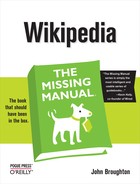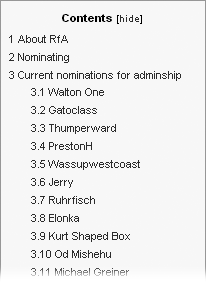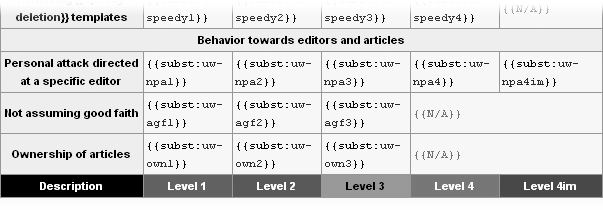In an ideal world, Wikipedia editors would discuss only content and would post only well reasoned, informative comments. They would assume, unless faced with overwhelming evidence, that other editors were also editing and commenting in good faith. Personal attacks would never occur.
Unfortunately it’s not an ideal world. Bad things do happen to good people. This chapter shows you helpful ways to respond to incivility and personal attacks directed against you or other editors. It also discusses what you should do if you slip up and use uncivil words, or worse, attack someone personally.
Note
If you’ve just experienced severe incivility or a personal attack, flip to “Initial Responses” on Initial Responses.
This chapter lays out some step-by-step processes for dealing with problematical editors. First, you need an understanding of Wikipedia’s rules regarding its editors’ behavior, and how those are enforced. With that understanding, you’ll find it easier to understand the step-by-step process.
Wikipedia’s rules for behavior center around two policies and a guideline. Experienced editors often mention the trio all in one breath: WP:CIVIL, WP:NPA, WP:AGF, or even just CIVIL, NPA, AGF.
Wikipedia:Civility (shortcut: WP:CIVIL). Being rude, insensitive, or petty makes people upset and prevents Wikipedia from working well. Be careful to avoid offending people unintentionally. For example, an edit summary of “Making content compliant with [[WP:NPOV]]” is less likely to upset an editor than “Removing garbage and biased personal opinions.”
Wikipedia:No personal attacks (shortcut: WP:NPA). Do not make personal attacks anywhere in Wikipedia. Comment on content, not on the contributor. Personal attacks damage the community and deter users. Nobody likes abuse.
Wikipedia:Assume good faith (shortcut: WP:AGF). Unless there’s strong evidence to the contrary, assume that people who work on the project are trying to help it, not hurt it.
Of the three, violations of NPA are considered the most serious, by far. Extreme or repeated violations will lead to an editor being blocked (prevented from editing) for a while, in the hopes that he comes to his senses. The administrator doing the blocking decides how long the blocked period lasts. If the editor doesn’t mend his ways, he’ll be blocked indefinitely.
Violations of AGF, on the other hand, don’t lead to blocking. The purpose of the AGF policy is to remind editors that underlying almost all incivility and, occasionally, personal attacks, is a lack of respect for other editors. It’s the incivility and personal attacks—the consequences of failing to assume good faith—that get an editor into trouble.
Violations of CIVIL but not of NPA can lead to blocking, but an editor must truly persist in uncivil behavior to get banned or blocked indefinitely. Some editors, nevertheless, have succeeded at this dubious accomplishment.
The entire Wikipedia community bears the responsibility of enforcing policies and guidelines. If you see incivility or personal attacks against another editor, you ought to help out, just as other editors should help out if they see incivility and personal attacks directed at you.
Normal editors can issue warnings, but they can’t prevent a problem editor from continuing to post to Wikipedia. That’s where administrators come in. Administrators are editors who have special authority, chosen by a rough consensus of editors. They can block editors from further edits, as a preventive measure against further abusive editing.
Figure 11-1. On December 10, 2007,Wikipedia:Requests for adminship (shortcut: WP:RFA) listed 19 open candidacies for adminship. Editors are expected to read the answers given by candidates to questions posed to them, and the opinions of others editors about the candidates, and research the information provided to ascertain whether the candidate seems trustworthy and capable of handling administrator responsibilities.
When one editor attacks another, she may think that any response by the attacked editor is defensiveness. A third editor entering the discussion can be quite a shock, particularly a third editor who civilly points out exactly what was done wrong and issues a warning.
Warnings serve a very important role in Wikipedia, in that they point out problems. As warnings accumulate on an editor’s talk page, they provide the basis for more severe warnings and, when all else fails, a block on the account. If you see a problem and post a warning, you’re not only informing an editor about problems with his edits, but you’re also building a case against that editor. Hopefully, the case will end quickly with the editor seeing reason, but, if not, it may end with the editor getting removed from Wikipedia.
Interestingly, standard user warnings found on the page Wikipedia:Template messages/User talk namespace (shortcut: WP:WARN) (see Figure 11-2) do not include any warnings about incivility (as of this writing). Presumably, either warnings for AGF or warnings for NPA cover incivility. For example, here’s the level 3 NPA warning: “Please assume good faith in your dealings with other editors. Please stop being uncivil to your fellow editors; instead, assume that they are here to improve Wikipedia.”
Note
There is no level 4, final warning for an AGF violation. Presumably that’s because there would be associated violations of the no personal attacks rule, and those would lead to a level 4 warning and then, if necessary, to a block.
As with vandalism and spam warnings (Issuing Warnings), you need to look at prior warnings to determine what level of warning to issue. Sometimes you shouldn’t issue a warning at all; for example, when a level 4 warning has already been issued, and there’s yet another personal attack. (In this case, you’d post at WP:AN/I, as discussed on AN/I.)
Figure 11-2. As of mid-2008, there was no formal warning template for incivility. Warnings regarding failure to assume good faith only went to level 3, meaning that it’s inappropriate to request that an editor be blocked for this problem (blocks require ignoring a level 4 warning). Wikipedia uses a catch-all “personal attacks” label for improper behavior toward other editors, and that can be the basis for blocking editors, whether or not they get level 4 warnings.
Should you remove personal attacks against other editors? The general answer is that personal attacks on article talk pages, where the posting has at least some relevance to the topic, should be left as is. But Wikipedia’s NPA policy specifies that serious personal attacks—those that reveal an editor’s personal information or “go beyond the level of mere invective”—should be deleted. Any attack that threatens an individual, the project, or the general community should be removed immediately. (For more on editing comments of other editors on talk pages, and other pages within Wikipedia where discussions occur, see Editing or Deleting Existing Comments.)
Many editors think of Wikipedia administrators as judges: They analyze the facts, weigh the arguments, and mete out punishments (blocking people from editing, or at least harshly threatening the miscreants). But that’s not the role of administrators. Administrators mostly do administrative tasks involving egregious cases of vandalism, deleting pages, protecting pages involved in edit wars, and so on. Furthermore, as the Wikipedia blocking policy (shortcut: WP:BP) says, blocks are for preventing damage to pages, not punishing users afterwards.
The difference may be difficult to grasp, but it’s important. It’s why warnings are so critical to fighting vandals and dealing with poor behavior. As well as giving an editor a chance to change his behavior, warnings—if ignored—demonstrate that the editor is unlikely to change his behavior in the future, and a block is the next step to protecting the project. Blocks typically start out being for short durations, and only escalate in length if an editor continues to show that he can’t restrain himself from repeating problematic behavior.
Wikipedia has only a small number of administrators—roughly a thousand—who are unpaid volunteers like all Wikipedia editors. Their number has not increased as quickly as Wikipedia has grown (see Figure 11-3), making their limited time a valuable resource that Wikipedia needs to protect. That’s why, in the processes described next, there’s so much emphasis on ways that editors can solve problems themselves, or get the assistance of other editors, rather than asking administrators for help.
Figure 11-3. The greatest number of editors became administrators per week around late 2005, when Wikipedia was much smaller than it is today. The number of active Wikipedia administrators has grown more slowly than Wikipedia as a whole. The graph shows “User Rights” granted, not “Admin Rights” granted, but almost all rights granted are for new admins. [This graph is courtesy of editor Dragons Flight (Robert A. Rohde), based on a log analysis.]



![The greatest number of editors became administrators per week around late 2005, when Wikipedia was much smaller than it is today. The number of active Wikipedia administrators has grown more slowly than Wikipedia as a whole. The graph shows “User Rights” granted, not “Admin Rights” granted, but almost all rights granted are for new admins. [This graph is courtesy of editor Dragons Flight (Robert A. Rohde), based on a log analysis.]](http://imgdetail.ebookreading.net/design/5/9780596515164/9780596515164__wikipedia-the-missing__9780596515164__httpatomoreillycomsourceoreillyimages19965.png)